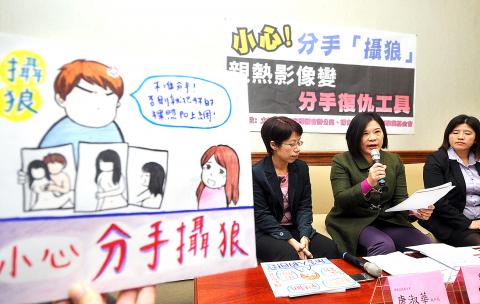Democratic Progressive Party Legislator Wu Yi-chen (吳宜臻) yesterday said she will push to amend the law to increase the penalties and fines for posting “revenge porn” online — uploading photographs or film clips to the Internet of another individual, without their consent, to seek revenge or to damage their reputation.
Recent court rulings in cases concerning the dissemination of personal pictures resulted in sentences of up to six months imprisonment, which could be converted to fines of up to NT$180,000, and that is too light, Wu said at a press conference in Taipei she held with representatives from the Taipei Women’s Rescue Foundation.
The planned amendments would seek to differentiate between the simple dissemination of photos and someone violating public decency (公然猥褻罪), with the latter receiving a far heavier penalty, rather than having one catch-all category, Wu said.

Photo: Fang Pin-chao, Taipei Times
Differentiating between the offenses would give judges more leeway in sentencing, as well as offer better protection [for witnesses] during investigations, she said.
She said there was still some debate on whether the proposed changes should be submitted for legislative review as amendments to the Criminal Code or as entirely new legislation.
A meeting is planned for March 8 to explain the proposed amendments to the public, the lawmaker said.
Foundation director-general Kang Shu-hua (康淑華) and attorney Wu Hsiu-e (吳秀娥) said they found it shocking that 57.5 percent of respondents to a foundation poll have consented to being filmed during sex while they were in a relationship, either as a short clip or a longer video.
There have been more than 66 cases in the past two years where former boyfriends have posted intimate photographs or sexual videos involving their former partners and more than 95.4 percent of the victims were female, Kang said.
She said 51.2 percent of the perpetrators in these cases had used photos or videos to threaten their former partner in a bid to get back together, while 28.8 percent had just been seeking revenge and to damage the reputation of the victim, Kang said.
The victims were often asked for sex or money, Kang said.
Wu said that if an individual is threatened by another using personal photos or film clips they can file a lawsuit on charges of intimidation.
Even if the victim consented to being photographed or filmed at the time, another individual does not have a right to disseminate the photos or film clips, and if they do so they could be charged with disseminating indecent materials, Wu said.
If the photos or film clips were taken without the victim’s consent, the individual using them could be charged with violating the privacy of others, she added.
Wu urged the public to report such offenses to police, adding that if a victim feels the police are not aggressively pursuing the case, they can appeal directly to a district prosecutors’ office if they have proof that they are being or have been threatened.

Alain Robert, known as the "French Spider-Man," praised Alex Honnold as exceptionally well-prepared after the US climber completed a free solo ascent of Taipei 101 yesterday. Robert said Honnold's ascent of the 508m-tall skyscraper in just more than one-and-a-half hours without using safety ropes or equipment was a remarkable achievement. "This is my life," he said in an interview conducted in French, adding that he liked the feeling of being "on the edge of danger." The 63-year-old Frenchman climbed Taipei 101 using ropes in December 2004, taking about four hours to reach the top. On a one-to-10 scale of difficulty, Robert said Taipei 101

A preclearance service to facilitate entry for people traveling to select airports in Japan would be available from Thursday next week to Feb. 25 at Taiwan Taoyuan International Airport, Taoyuan International Airport Corp (TIAC) said on Tuesday. The service was first made available to Taiwanese travelers throughout the winter vacation of 2024 and during the Lunar New Year holiday. In addition to flights to the Japanese cities of Hakodate, Asahikawa, Akita, Sendai, Niigata, Okayama, Takamatsu, Kumamoto and Kagoshima, the service would be available to travelers to Kobe and Oita. The service can be accessed by passengers of 15 flight routes operated by

Taiwanese and US defense groups are collaborating to introduce deployable, semi-autonomous manufacturing systems for drones and components in a boost to the nation’s supply chain resilience. Taiwan’s G-Tech Optroelectronics Corp subsidiary GTOC and the US’ Aerkomm Inc on Friday announced an agreement with fellow US-based Firestorm Lab to adopt the latter’s xCell, a technology featuring 3D printers fitted in 6.1m container units. The systems enable aerial platforms and parts to be produced in high volumes from dispersed nodes capable of rapid redeployment, to minimize the risk of enemy strikes and to meet field requirements, they said. Firestorm chief technology officer Ian Muceus said

MORE FALL: An investigation into one of Xi’s key cronies, part of a broader ‘anti-corruption’ drive, indicates that he might have a deep distrust in the military, an expert said China’s latest military purge underscores systemic risks in its shift from collective leadership to sole rule under Chinese President Xi Jinping (習近平), and could disrupt its chain of command and military capabilities, a national security official said yesterday. If decisionmaking within the Chinese Communist Party has become “irrational” under one-man rule, the Taiwan Strait and the regional situation must be approached with extreme caution, given unforeseen risks, they added. The anonymous official made the remarks as China’s Central Military Commission Vice Chairman Zhang Youxia (張又俠) and Joint Staff Department Chief of Staff Liu Zhenli (劉振立) were reportedly being investigated for suspected “serious